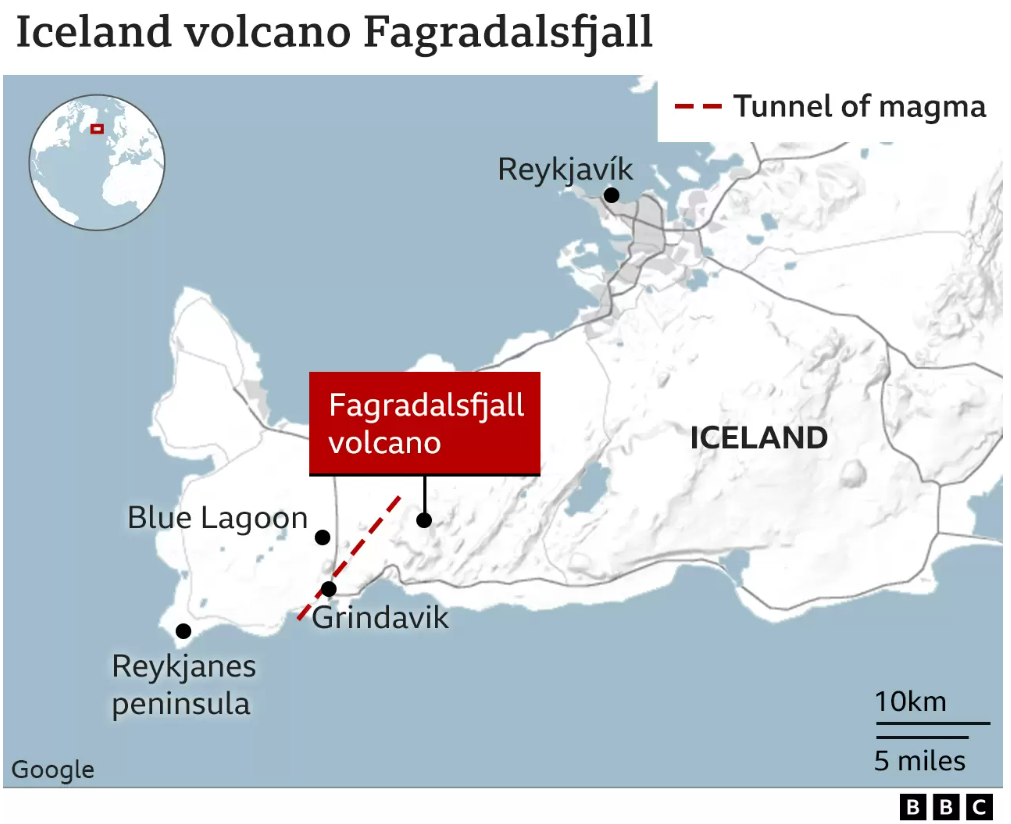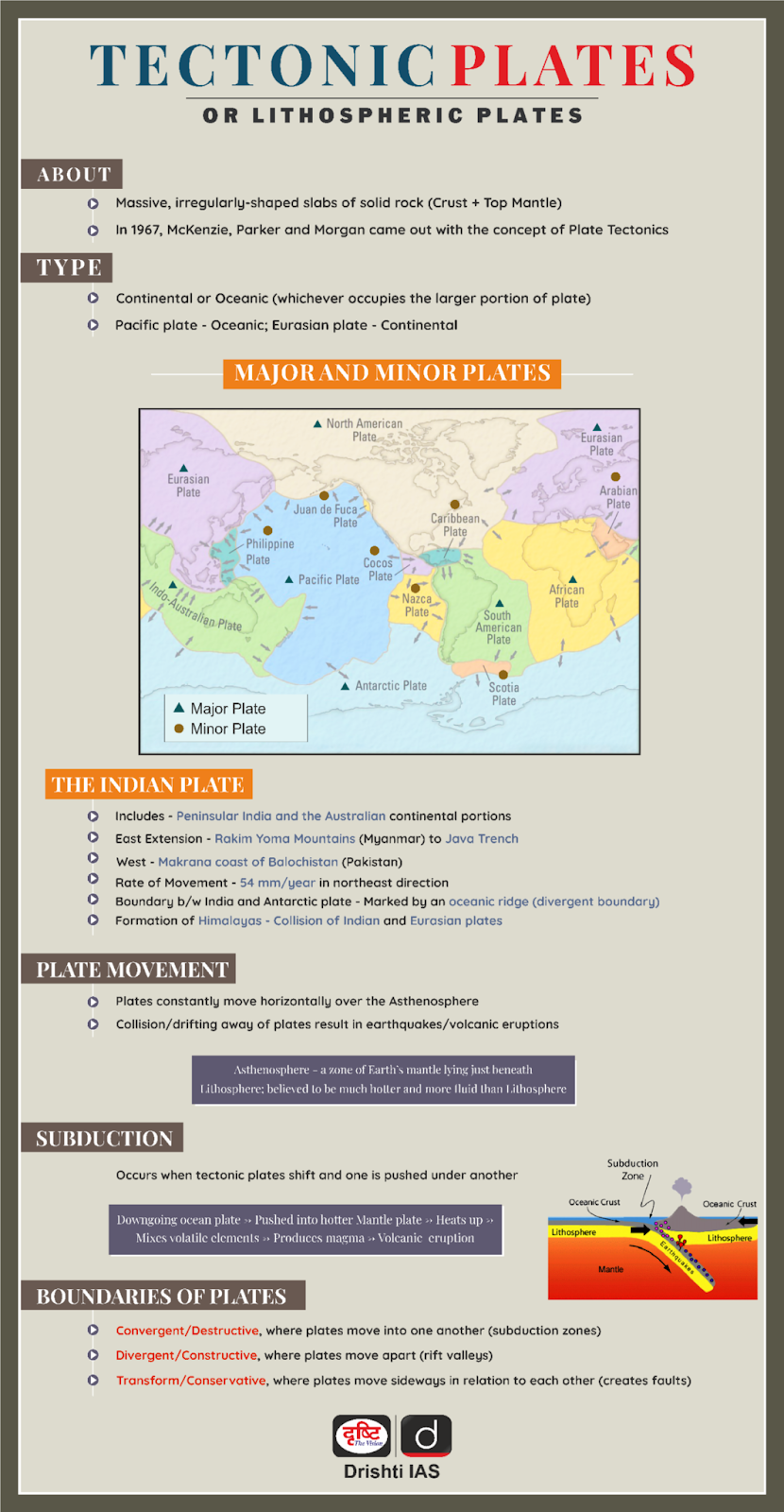Thousands of Earthquakes Rock Iceland | 17 Nov 2023
For Prelims: Volcanoes, Earthquake, Iceland, Reykjavík, Mid-Atlantic Ridge, Atlantic Ocean, Eurasian And North American Tectonic Plates.
For Mains: Phenomenon of Earthquake and Volcano, Correlation between an earthquake and a volcano.
Why in News?
Iceland has declared a state of emergency following a series of 800 earthquakes that struck the southwestern Reykjanes peninsula in less than 14 hours.
- Approximately 1,400 earthquakes were detected in a day, and the peninsula has experienced over 24,000 seismic events since late October. The strongest of these earthquakes, with a magnitude of 5.2, occurred approximately 40 km from Reykjavík, Iceland's capital.
What is Happening in Iceland?
- About Iceland:
- Iceland is located on the Mid-Atlantic Ridge, technically the longest mountain range in the world, but on the floor of the Atlantic Ocean. The ridge separates the Eurasian and North American tectonic plates — making it a hotbed of seismic activity.
- The Mid-Atlantic Ridge is a divergent or constructive plate boundary where tectonic plates move away from each other, leading to the creation of new oceanic crust
- This geological setting makes the region prone to frequent earthquakes, with an annual average of approximately 26,000, as reported by Perlan, a natural history museum based in Reykjavik.
- While most of these tremors go unnoticed, the occurrence of earthquake swarms, characterized by numerous small earthquakes without a discernible mainshock, raises concerns about the possibility of an impending volcanic eruption.
- These earthquake swarms indicate heightened tectonic stress in specific areas.
- Iceland is located on the Mid-Atlantic Ridge, technically the longest mountain range in the world, but on the floor of the Atlantic Ocean. The ridge separates the Eurasian and North American tectonic plates — making it a hotbed of seismic activity.
- Notable Icelandic Volcanoes:
- Iceland boasts a total of 33 active volcanoes.
- Eyjafjallajökull, one of Iceland's most famous volcanoes, erupted in 2010, causing a widespread ash cloud.
- Other notable volcanoes include Hekla, Grímsvötn, Hóluhraun, and Litli-Hrútur, part of the Fagradalsfjall system.
How are Earthquake Swarms a Sign of Volcanic Activity?
- Magma Formation and Movement:
- Intense heat beneath the Earth's surface melts rocks, giving rise to magma, a flowing substance lighter than solid rock.
- The buoyancy of magma propels it upwards, with most of it being confined to magma chambers deep underground.
- Volcanic Eruptions:
- While the majority of magma cools and solidifies over time, a fraction erupts through vents and fissures on the Earth's surface.
- These eruptions are the visible outcomes of the geological processes occurring beneath the surface.
- Earthquake Swarms as Indicators:
- The movement of magma near the Earth's surface exerts force on surrounding rock layers.
- This force often leads to the occurrence of earthquake swarms, clusters of seismic activity in a particular region.
- Proximity to Eruption:
- Magma movement underground doesn't always culminate in a volcanic eruption.
- The closer magma gets to the Earth's surface, the higher the likelihood of an eruption, accompanied by more frequent and symptomatic earthquake swarms.
UPSC Civil Services Examination Previous Year Question (PYQ)
PRELIMS:
Q. Consider the following: (2013)
- Electromagnetic radiation
- Geothermal energy
- Gravitational force
- Plate movements
- Rotation of the earth
- Revolution of the earth
Which of the above are responsible for bringing dynamic changes on the surface of the earth? (2013)
(a) 1, 2, 3 and 4 only
(b) 1, 3, 5 and 6 only
(c) 2, 4, 5 and 6 only
(d) 1, 2, 3, 4, 5 and 6
Ans: (d)
Mains:
Q1. Mention the global occurrence of volcanic eruptions in 2021 and their impact on regional environment. (2021)
Q2. Why are the world’s fold mountain systems located along the margins of continents? Bring out the association between the global distribution of fold mountains and earthquakes and volcanoes. (2014)


